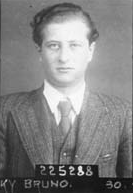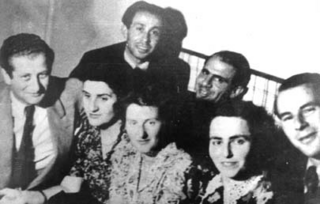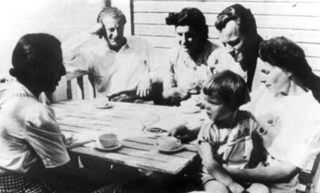Dr. Bruno Kreisky

Personalia
Born:
Died:
Profession:
Persecution:
Imprisonment 16.03.1938 - 08.08.1938,
Emigration August 1938
Memberships
Curriculum Vitae
Bruno Kreisky was born into the Jewish family of Max Kreisky and Irene, née Felix, as their legitimate son. Max Kreisky is General Director of Österreichische Wollindustrie AG and Textil AG, censor of the Austrian National Bank and member of the Central Association of Commercial Employees. Irene Felix came from a family of food producers, and the Felix brand name still exists today.
After elementary school, Bruno Kreisky attended the Radetzkystraße grammar school and joined the Association of Socialist Secondary School Students. In 1927, he joined the Socialist Workers' Youth (SAJ).
In 1930, he became chairman of the regional organization for the surrounding Viennese communities of Purkersdorf, Klosterneuburg and Tulln, and in 1933 he headed the SAJ's educational and cultural work.
In 1929, Bruno Kreisky enrolled in law at the University of Vienna, which he did at the suggestion of the party chairman of the Social Democratic Workers' Party (SDAP) [today: SPÖ], Otto Bauer. In 1931, he resigned from the Jewish Community (IKG) and henceforth described himself as agnostic.
Bruno Kreisky took part in the socialist February Uprising of 1934 by distributing propaganda material. On February 18, 1934, he took part in a meeting of former SAJ functionaries in the Vienna Woods where the Revolutionary Socialist Youth was founded under the leadership of Roman Felleis and Kreisky. Kreisky attended several meetings of the now illegal party in Czechoslovakia
Because of his illegal activities, Bruno Kreisky was arrested in his parents' apartment on January 30, 1935 and sentenced to one year in prison for high treason on March 16, 1936. He was released on June 3, 1936, but was expelled from all universities.

A few days later, Bruno Kreisky flies to Denmark without a visa, where he is almost sent back to Austria by the police at Copenhagen-Kastrup Airport. Thanks to a transit visa organized by friends at the last moment, he is allowed to enter Denmark after all and can organize his further escape from there.
First he applies for emigration to Bolivia, but then receives an invitation to Sweden from the chairman of the Swedish Young Socialists, Torsten Nilsson.
In the summer of 1940, Bruno Kreisky met Willy Brandt, who was living in exile in Norway - the beginning of a lifelong friendship. He worked with Brandt in the international group of democratic socialists, also known as the "Little International", on issues relating to Europe's post-war order.

In May 1946, he returned to Vienna, joined the Foreign Ministry and was sent back to Sweden to set up the Austrian legation there. From 1947, he was Legation Secretary under Ambassador Paul Winterstein. From 1951 he was foreign policy advisor to Federal President Theodor Körner, and in 1953 he became State Secretary under Foreign Minister Karl Gruber and Leopold Figl. He is involved in the negotiations on the Austrian State Treaty. From 1959 to 1966, he is Foreign Minister.
Between 1970 and 1983, Bruno Kreisky is finally Federal Chancellor of the Republic of Austria. Between 1970 and 1971, he headed a minority government supported by FPÖ party leader Friedrich Peter, who had been an SS-Obersturmführer in Infantry Regiment 10 of the 1st SS Infantry Brigade before 1945. His governments up to 1983 also included many ministers with a former Nazi past, such as the SA and SS member Untersturmführer Johann Öllinger, the illegal NSDAP member and fraternity member Oskar Weihs or the NSDAP members Günther Haiden, Otto Rösch, Josef Moser and Erwin Frühbauer. There is no phase of Austrian politics in which so many former National Socialists were politically active.
Places
Residence:
Honoring:
Citations
Wiener Stadt- und Landesarchiv (WStLA)
Wikipedia unter de.wikipedia.org/wiki/Bruno_Kreisky
Der Standard vom 19.12.2005: Kreiskys braune Minister
